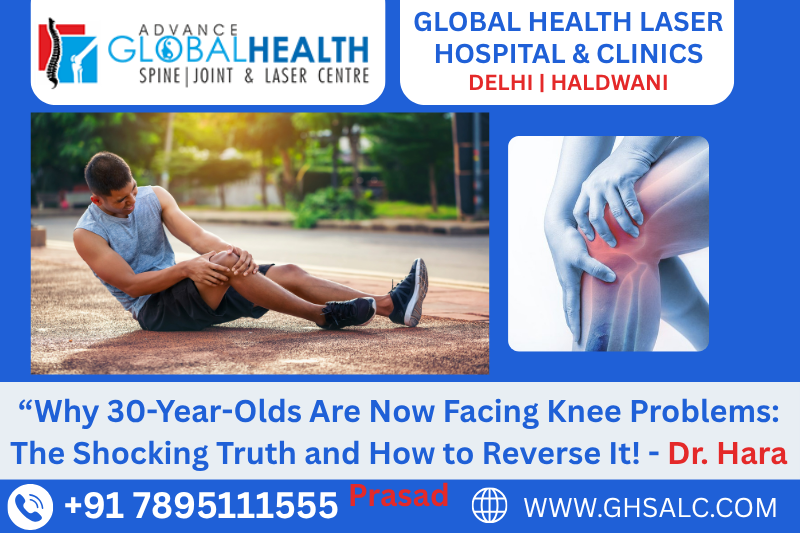By Dr. Haraprasad,(MPT-Ortho), Laser Specialist – Global Health – Spine | Joint & Laser Centre
In recent years, a startling trend has emerged—individuals in their 30s are increasingly reporting knee pain, stiffness, and early signs of joint degeneration. Once considered a concern primarily for those above 50, knee damage is now affecting younger adults at an alarming rate. A growing body of scientific research sheds light on why this is happening and how it can be prevented and treated without surgery.
What the Research Says
According to a 2023 study published in The Journal of Orthopaedic Research, sedentary lifestyles combined with sudden intense physical activity—common among young professionals and gym-goers—are contributing to early wear and tear of knee cartilage. Another article in Arthritis & Rheumatology (2022) linked high BMI, poor postural habits, and prolonged sitting to early onset of osteoarthritis in younger adults.
MRI-based studies also confirm that structural knee changes, including meniscal degeneration and cartilage thinning, are now visible in people as young as 28–35 years old (source: Radiology Journal, 2021).
Why Is This Happening So Early?
- Prolonged Sitting and Lack of Movement: Desk jobs and digital lifestyles restrict blood flow to the joints and weaken stabilizing muscles around the knee.
- Improper Exercise Habits: High-impact workouts without adequate warm-up, poor technique, or sudden weight changes strain the knee joint.
- Obesity and Inflammation: Excess weight puts additional load on the knees, accelerating cartilage breakdown and inflammation.
- Vitamin D Deficiency and Poor Nutrition: Studies show nutritional deficiencies play a role in joint degradation and poor bone health.
Prevention Starts Early
• Movement is Medicine: Regular, low-impact activities like swimming, cycling, yoga, and walking strengthen the muscles supporting the knee.
• Weight Management: Maintaining an optimal BMI reduces joint load and inflammation.
• Ergonomic Awareness: Ensuring correct posture while sitting and using orthopedic chairs can delay knee damage.
• Balanced Diet & Supplements: Including Omega-3s, calcium, vitamin D3, and collagen can support joint health.
Advanced Non-Invasive Treatments Available
At Global Health – Spine | Joint & Laser Centre, we offer evidence-based, non-surgical therapies that target the root cause of knee pain: - Robotic Orthotripsy & Shockwave Therapy: Stimulates cartilage repair and reduces inflammation.
- High-Power Pulsed Nd:YAG Laser Therapy: Increases microcirculation, reduces pain, and promotes regeneration at the cellular level.
- Joint Regeneration Protocols: We utilize PMR Therapy (Pulsed Magnetic Resonance) to:
-Oscillate bone tissue and mesenchymal stem cells
-Activate microcirculation
-Stimulate natural cartilage and bone repair mechanisms - Digital Gait & Knee Biomechanics Correction: Personalized exercise and correction programs using advanced diagnostics to realign and unload damaged knees.
The Takeaway
Early knee damage is no longer a condition of the elderly. If you’re in your 30s and experiencing knee discomfort, it’s time to act. With the right knowledge, preventive habits, and cutting-edge non-invasive treatments, it’s possible to restore joint function and avoid future surgeries.
Reference Articles:
• Arthritis & Rheumatology, 2022 – “Early-Onset Osteoarthritis in Working-Age Adults”
• Journal of Orthopaedic Research, 2023 – “Cartilage Wear in Sedentary vs. Active Populations”
• Radiology Journal, 2021 – “MRI-based Detection of Knee Degeneration in Young Adults”
For consultations and treatment, visit Dr. Haraprasad at Global Health – Spine | Joint & Laser Centre, New Delhi & Haldwani.


